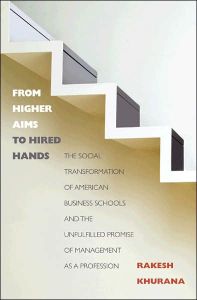
From Higher Aims to Hired Hands
The Social Transformation of American Business Schools and the Unfulfilled Promise of Management as a Profession
Recommendation
This brilliant book is a sociological study of the modern business school, an ill-understood institution that has had a profound impact on the world's economy. Insider Rakesh Khurana, a professor at Harvard, begins in the late 19th century, when B-schools were born into a burgeoning America. Wharton was the first true B-school, established in 1881 with $100,000 from Joseph Wharton, a Pennsylvania Quaker. Programs at elite colleges, such as Dartmouth and Harvard, soon followed. Nasty teething pains, however, upset business schools’ infancy. Academics didn’t agree on curriculum or even purpose. Moreover, the nagging question about whether business (or “management”) was a real profession lingered. In adolescence, the gawky B-schools looked longingly at their unquestionably legitimate, older, wealthier siblings: graduate schools for law and medicine. This led to a business-school image makeover that didn’t quite work, according to the author, leaving today’s B-schools facing mid-life anomie as the economic value of B-school enrollment – and the resulting M.B.A. – drops. getAbstract recommends this book to anyone who wants to understand the past and future of this influential institution.
Summary
About the Author
Rakesh Khurana is an associate professor of organizational behavior at Harvard Business School.







Comment on this summary